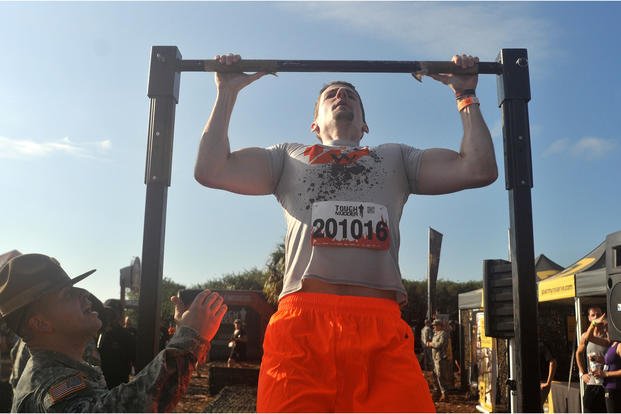Of all the exercises, the one with the largest mind game attached to it is the pull-up. One thing I have learned is that women and men cannot do pull-ups if they do not practice pull-ups.
On the flip side, the common denominator among those men and women who can do dead-hang pull-ups are those who practice pull-ups.
In my opinion, one of the worst things we ever developed in physical fitness classes was the "girl pull-up," or flexed arm hang. At an early age, we have been telling young girls that they cannot do regular pull-ups, because they never will be as strong as boys. Well, part of that statement is true -- the strongest woman never will be stronger physically than the strongest man -- but I have seen 40- to 50-year-old mothers of three do 10 pull-ups. How is that? They practice pull-ups as well as the auxiliary exercises that work the muscles of the back, biceps and forearms -- the pull-up muscles. Anybody can do pull-ups, but it helps not to be 40-50 pounds overweight and to follow a program that places pull-ups and the following exercises in your workouts at least three times a week.
Related Video: Pullups: Going from Zero to 20 Reps
The Proper Pull-up (Regular Grip)
Grab the pull-up bar with your hands placed about shoulder width apart and your palms facing away from you. Pull yourself upward until your chin is over the bar and complete the exercise by slowly moving to the hanging position.
Pull-ups (Negatives)
If you cannot do any pull-ups, you should try "negatives." Negatives are half pull-ups. All you have to do is get your chin over the bar by standing on something or having a spotter push you over the bar. Then, you slowly lower yourself all the way down -- let your arms hang grasping the bar fully stretched. Keep your feet up and fight gravity for a count of five seconds. This will get your arms used to supporting your weight.
Assisted Pull-ups
This is the first step to being able to perform pull-ups. Using the bar that is 3-4 feet off the ground, sit under it and grab with the regular grip. Straighten your back, hips and slightly bend your knees while your feet remain on the floor and pull yourself to the bar so that your chest touches the bar. Repeat as required. This is a great way to start out if you cannot do any pull-ups at all. You also can do this on a pair of parallel bars that are used for dips. These are also great to do after you no longer can perform any more dead-hang pull-ups. This is a good replacement for the lat pulldown machine as well.
Pulldowns
Using a pulldown machine, grab the bar, sit down and pull the bar to your collarbone. Keep the bar in front of you. Behind-the-neck pulldowns are potentially dangerous to your neck and shoulders.
Dumbbell Rows
Bend over and support your lower back by placing your hand and knee on the bench as shown. Pull the dumbbell to your chest area as if you were starting a lawn mower. Muscles worked: Back, forearm grip, biceps muscles.
Biceps Curls
Place dumbbells or bar in hands with your palms facing upward. Use a complete range of motion to take the weight from your shoulders to your hips by bending and straightening the elbows. Keep it smooth. Do not swing the weights.
You can build your strength, and within a few months of this workout, you will have your first pull-up in years -- maybe ever. If weight loss is desired, naturally find a plan that incorporates cardiovascular exercise, diet and nutrition tips, and weights and calisthenics if your next goal is to do a pull-up one day. Good luck and always remember to consult with your doctor before starting any fitness program.
Related Video: Increase Your Pushups and Pullups - Quickly!
Stew Smith is a former Navy SEAL and fitness author certified as a Strength and Conditioning Specialist (CSCS) with the National Strength and Conditioning Association. Visit his Fitness eBook store if you’re looking to start a workout program to create a healthy lifestyle. Send your fitness questions to stew@stewsmith.com.
Want to Learn More About Military Life?
Whether you're thinking of joining the military, looking for fitness and basic training tips, or keeping up with military life and benefits, Military.com has you covered. Subscribe to Military.com to have military news, updates and resources delivered directly to your inbox.



















